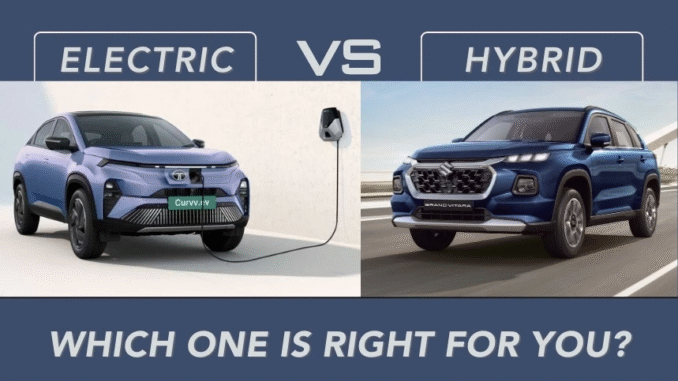
Electric vs. Hybrid: Which One Is Right for You?
With climate concerns on the rise and fuel prices always fluctuating, more drivers are considering environmentally friendly alternatives to traditional gas-powered vehicles. Among the most popular options are electric vehicles (EVs) and hybrid vehicles (HEVs or plug-in hybrids). But with both claiming to save you money and reduce your carbon footprint, how do you decide which one suits your needs?
In this article, we’ll break down the key differences between electric and hybrid cars, and help you figure out which one is right for your lifestyle, budget, and driving habits.
Understanding the Basics
Electric Vehicles (EVs)
Electric vehicles run entirely on electric power. Instead of a gas engine, they use an electric motor powered by a battery pack that needs to be recharged through a wall outlet or charging station.
- Popular Models: Tesla Model 3, Nissan Leaf, Ford Mustang Mach-E
- Charging: Requires access to a charging station or home charger
- Emissions: Zero tailpipe emissions
Hybrid Vehicles (HEVs and PHEVs)
Hybrid cars combine a gasoline engine with an electric motor. There are two main types:
- HEVs (Hybrid Electric Vehicles): These self-charge through regenerative braking and the engine. No need to plug in.
- PHEVs (Plug-in Hybrid Electric Vehicles): These can be plugged in to charge a larger battery and drive short distances on electricity alone.
- Popular Models: Toyota Prius (HEV), Toyota RAV4 Prime (PHEV), Hyundai Ioniq
Cost Comparison
Upfront Costs
- Electric vehicles generally cost more upfront due to expensive battery technology.
- Hybrids, especially non-plug-in models, tend to be more affordable than full EVs.
However, EV prices are falling, and many governments offer tax incentives or rebates that help reduce the purchase cost. PHEVs may also qualify for these incentives.
Fuel and Maintenance Costs
- EVs have lower operating costs. Charging is typically cheaper than buying gasoline, and EVs have fewer moving parts, which means lower maintenance bills.
- Hybrids still require gas and more maintenance than EVs (e.g., oil changes), but they’re generally more efficient than traditional vehicles.
Verdict:
If you’re looking at long-term savings and can afford the upfront cost, EVs tend to come out ahead.
Driving Range and Refueling
EV Range
Most EVs offer between 150 to 350 miles of range on a full charge, depending on the model. However, range can vary based on weather, driving style, and terrain.
Hybrid Range
- HEVs have smaller batteries and rely on gas for long trips, so they typically get 40–60 miles per gallon and can drive 500+ miles on a full tank.
- PHEVs can go 20–50 miles on electric power, then switch to gas for extended range.
Charging vs. Fueling
- EVs require time to charge—anywhere from 30 minutes at a fast charger to 8–12 hours at home.
- Hybrids can be refueled at any gas station, with no need to worry about charging infrastructure.
Verdict:
If you regularly drive long distances or don’t have reliable access to charging, a hybrid may be more convenient. For daily commuting and urban use, an EV is often more than sufficient.
Environmental Impact
EVs: The Cleanest Option
EVs produce zero tailpipe emissions, making them ideal for reducing urban air pollution and overall greenhouse gases. When charged with renewable energy (like solar or wind), they are among the greenest options available.
Hybrids: Cleaner Than Gas, But Still Polluting
Hybrids are better for the environment than traditional vehicles, but they still burn fossil fuels. PHEVs offer a middle ground—clean electric miles for short trips and gas for longer ones.
Verdict:
If environmental impact is your top concern, electric vehicles are the best choice.
Performance and Driving Experience
Electric Vehicles
EVs are known for their smooth, quiet rides and instant torque, which provides quick acceleration. They also have a lower center of gravity, improving handling.
Hybrids
Hybrids offer a familiar driving experience, though transitioning between gas and electric modes can sometimes feel less seamless. PHEVs often offer EV-like performance at low speeds but rely on the gas engine at higher speeds or for longer trips.
Verdict:
If you enjoy a modern, responsive drive, EVs are typically more fun behind the wheel.
Availability and Infrastructure
Charging Network
While public charging networks are growing fast, they’re still not as widespread as gas stations—especially in rural areas. Home charging is ideal for EV owners but may not be feasible for apartment dwellers.
Hybrid Flexibility
Hybrids don’t rely on charging infrastructure, making them more convenient for people in areas without easy access to charging stations.
Verdict:
If you live in an area with limited charging options, a hybrid might be more practical. If you have home charging or live in a city with a robust EV network, an electric car is a great fit.
Which One Is Right for You?
Here’s a quick breakdown to help guide your decision:
| Criteria | Best Choice |
|---|---|
| Budget-Friendly | Hybrid |
| Lowest Operating Costs | Electric |
| Long-Distance Travel | Hybrid (especially PHEV) |
| Daily Urban Commute | Electric |
| Environmentally Friendly | Electric |
| No Access to Charging | Hybrid |
| Cutting-Edge Features | Electric |
| Familiar Driving Feel | Hybrid |
Final Thoughts
Both electric and hybrid vehicles offer cleaner, smarter alternatives to traditional gas-powered cars. Choosing the right one depends on your budget, driving habits, location, and access to charging.
If you’re ready to embrace a greener lifestyle and have access to reliable charging, an electric vehicle could be your best bet. On the other hand, if you need flexibility, drive long distances, or want to ease into the transition, a hybrid—especially a plug-in—might be the smarter choice for now.
Whichever path you take, you’re making a step toward a more sustainable future.
